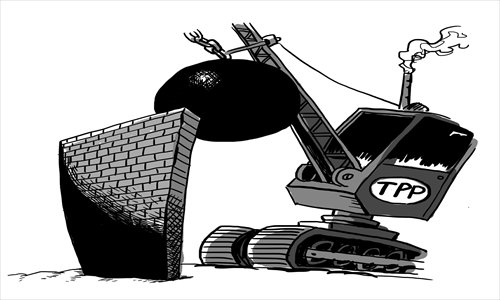New agreements by US do not block Asian integration

The role of the US in the Diaoyu Islands dispute has been hotly discussed recently. Some observers hold that the dispute is a conspiracy by the US, intended to disturb the economic integration of East Asia and facilitate the development of the TPP.
With the deterioration of the Diaoyu Islands dispute, the prospects of East Asian economic integration are not promising. However, this doesn't necessarily mean opportunities for the TPP.
East Asian countries have pursued regional economic integration since the 1990s, aiming at effectively competing with Europe and North America. The expectation on regional economic integration is especially growing with the rapid economic growth of China and the world's economic center moving toward the Asia-Pacific region.
Currently, there are several regional integration organizations. But the TPP is part of the US strategy to increase its dominance in the Asia-Pacific region. If the TPP is successful, not only will APEC will be replaced, but those regional integration organizations based on ASEAN and lead by Asian countries will lose ground. Many Asian countries are thus deeply worried about the development of the TPP. But the TPP is unlikely to develop as the US expects.
The threshold for joining the TPP is too high, and the development of its current members is uneven. It's hard to reach compromises over many issues. The development gap is an insurmountable hurdle, as the TPP includes not only the world's most developed countries like the US but also developing countries such as Vietnam and Chile.
The TPP negotiations have set higher goals than traditional FTA negotiations. They are aimed at solving problems such as tariff and technological barriers as well as setting higher criteria for free trade and investment in many areas.
This means that developing countries who want to join the TPP must make a choice between short-term economic interests and mid- and long-term strategic development, and even sacrifice some strategic industries related to national interests.
Even some developed countries cannot meet the requirements of the TPP. The hesitation of Japan on TPP is related to the strong opposition from its agriculture department. So far, although negotiations in some fields have made some progress, the main problems haven't been solved and breakthroughs are unlikely in the near future.
The advocacy of the TPP by the US has deep political considerations. It aims at dominating or disturbing the integration. The TPP negotiations are centered on the US, but in reality China is the trade center of Asia and the biggest trading partner of Japan, South Korea and ASEAN. Though the US has announced TPP doesn't exclude China, under existing conditions, participation in the TPP will be definitely harmful to some of China's strategic industries.
The Asian countries, especially Japan and South Korea, know clearly that their future growth is closely related to China's economic development. Therefore, the China-ASEAN FTA has been established smoothly and trilateral cooperation between China, Japan and South Korea has been promoted.
If a FTA among China, Japan and South Korea could be established, it will facilitate a greater East Asian FTA. But the TPP hopes to disturb the process.
The Asian economic integration is an open process. The US as the biggest economy in the Asia-Pacific region should certainly participate and Asian regional integration should also constructively consider how to include the US. But the US needs to be aware that Asia cannot be manipulated.
Some Asian countries are hedging out of political and strategic considerations, this is inevitable. The Diaoyu Islands dispute does disturb the Asian economic integration, but it's only temporary. Asian economic integration cannot be fully stopped, because market factors lie behind it.
The author is an assistant researcher at the Institute for World Economy Studies, Shanghai Institutes for International Studies. opinion@globaltimes.com.cn